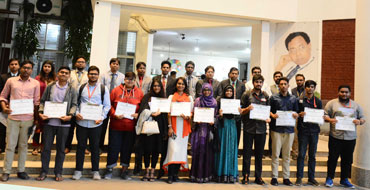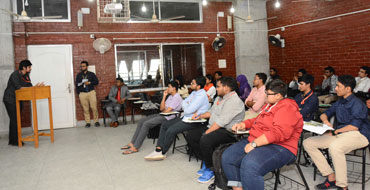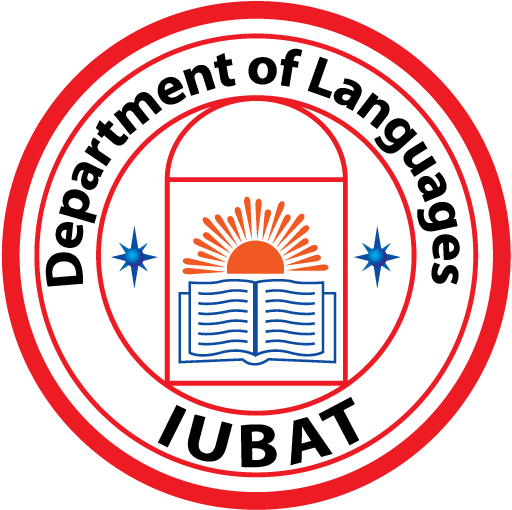Research & Publications
12
research centers
Rich
laboratories
BDT 20 Million
annual research budget
Research
The English Program encourages both students and teachers to conduct inclusive and extensive research to create knowledge in different areas of English Literature and Applied Linguistics and ELT. Research areas of Applied Linguistics and English Language Teaching (ELT) include English as a Foreign Language, English Language Assessment, English for Specific Purpose, Phonetics and Phonology, Syntax, Semantics, Pragmatics, Discourse Analysis, Stylistics, and Psycholinguistics. Prominent research areas of English Literature include Modern and Contemporary Literature, 21st century Literature and contemporary British and American fiction; women’s writing from the eighteenth century to the present; early modern literature and culture, including Shakespeare; popular Victorian fiction; Romantic poems, critical theory; and postcolonial studies.
The Program offers educational foundation in terms of research and diverse knowledge to students in order to make them accomplished professionals capable of conducting applied and theoretical research. It also instills research skills in its students so that they can identify a research area and conduct research in the aforementioned fields. Research in Applied Linguistics and ELT facilitates investigation of complex learning and teaching difficulties in the region and provides solutions of enormous challenges that the learners and teachers face in ESL contexts inside and outside the classroom environment. Research in literature unveils the mysterious horizon that someone could never reach without the study of literature in different contexts. In-depth study of English literature and their critical analysis opens up a world of inspiration and creativity, while also developing skills that are highly valued in today’s world. Research on stories, poems, novels etc. shows the learners how literature provides meaning of the world.
The faculties are encouraged and patronized to develop research proposals and provided with the required fund, guidance, and other supports in materializing the developed research proposals. The students get involved in conducting small scale researches in different courses in whole graduation. The students under the program are also required to submit a thesis paper based on their extensive research work. We place a great emphasis on knowledge creation in the field of Literature, English Linguistics and English Language Teaching. We aim at involving our students in knowledge creation through extensive research works in different areas so that they can identify the significance of research in academia. It is compulsory for all students to identify a research area to investigate and prepare a long paper that they prepare in the last semester of graduate study. It requires extensive research work on the part of the student. An assigned professor supervises the research work. Writing a research paper gives the chance to apply the gained knowledge during the whole program. It demonstrates students’ original research work and adds knowledge to the existing literature. The students are supposed to present their research works in a thesis defense in front of ‘Thesis Defense Board’ headed by a session chair. Thus, it is a rigorous process to shape students’ research skill and it gives the students a solid foundation for future research. This thesis is an integral component of the English program, worth 9 credit hours.
Along with the foundation and advance courses, the program offers research methodology course to make the learners familiar with the research skills required to conduct research in different fields of English Literature and Applied Linguistics and ELT. We encourage the students to initiate researches in different areas both in narrow and wide scale. The worthy initiatives receive research grants. We also put much emphasis on the development of maturity of knowledge acquired by the students. Learners are supposed to design and accomplish project works in many intermediate and advanced courses.
Research fund and facilities are provided by the IUBAT authority for functioning research activities. The authority always extends its support for all kinds of activities related to research in emerging fields of English Literature and Applied Linguistics and ELT.
The specialized faculty members and enthusiastic students submit new research proposal/s to MAMRI that provides technical assistance and other facilities required to accomplish the submitted proposal.
The faculties who conduct research work share their research findings across the whole community; the other faculties also provide feedback on shared works. Such sharing and feedback culture enhances team work and enriches research knowledge in the respective fields.

Fund and Facilities
Research fund and facilities are provided by the IUBAT authority for functioning research activities. The authority always extends its support for all kinds of activities related to research in emerging fields of English Literature and Applied Linguistics and ELT.

Fund Hunting
The specialized faculty members and enthusiastic students submit new research proposal/s to MAMRI that provides technical assistance and other facilities required to accomplish the submitted proposal.

Dissemination of Research Findings
The faculties who conduct research work share their research findings across the whole community; the other faculties also provide feedback on shared works. Such sharing and feedback culture enhances team work and enriches research knowledge in the respective fields.
Faculty Research
Dr Bijoy Lal Basu
Title: Ambiguities and Tensions in the Role and Use of English in Bangladesh
Abstract: Over the past few years, there has been a revival of interest in the English language in Bangladesh with the government putting a lot of emphasis on the teaching and learning of English. There have been a plethora of initiatives at the macro-level to strengthen English language education in urban as well as rural areas in the country which are to a certain extent complemented by micro-level initiatives at the family level. Parents aspire for their children to master the English language and spend on private tuition according to their abilities to ensure that learners achieve good results in English and other subjects. Young people, on their part, are keen to learn and use English alongside Bangla, sometimes mixing them together in the same breath in ways that appear outrageous and ridiculous to a lot of people holding tenaciously onto rather conservative views about roles and use of language in national identity formation. Although there is a general consensus that Bangladeshis need English to move ahead in the context of globalization, how English should be used, where and to what extent are issues that are far from being resolved. English is viewed both as an essential lingua franca and a threat to the vitality of Bangla. English is also often blamed for the perceived corruption of Bangla in the media. This paper focuses on the ambiguities and tensions surrounding the roles and use of English vis-à-vis Bangla in Bangladesh.
Dr. Md. Momtazur Rahman
Title: English for Specific Purposes (ESP): A Holistic Review
Abstract:English for Specific Purposes, known as acronym-‘ESP’, has been a distinct activity in the field of English Language Teaching (ELT) since 1960s. The flowering period of ESP has been identified due to many incidents like the second world war in 1945, the rapid expansion in scientific, the growth of science and technology, the increased use of English as the international language of science, technology and business, the increased economic power of certain oil-rich countries and increased numbers of international students studying in English Speaking countries. Needs analysis is the key essence of ESP. The paper reviews the history and development of ESP, the notion of needs analysis in ESP setting and some important components of ESP needs analysis. Finally the paper critically reviews the ESP needs analysis models. TSA (Target Situation Analysis), PSA (Present Situation Analysis), LSA (Learning Situation Analysis), MA (Means Analysis) and Language Audit are the salient features of needs analysis in any ESP context. In the field of ESP, there are a number of models of needs analysis such as Munby (1978), McDonough (1984), Hutchinson & Waters (1987), Robinson (1991), West (1994), Jordan (1997) and Dudley-Evans & St. John (1998). These theoretical models are similar to a certain extent that they aim at identifying the English language needs of the learners. The paper provides the readers with a solid review on some ESP needs assessment models.
Student Research

Research Courses
Along with the foundation and advance courses, the program offers research methodology course to make the learners familiar with the research skills required to conduct research in different fields of English Literature and Applied Linguistics and ELT.

Research Initiatives
We encourage the students to initiate researches in different areas both in narrow and wide scale. The worthy initiatives receive research grants.

Project Work/Submission
We also put much emphasis on the development of maturity of knowledge acquired by the students. Learners are supposed to design and accomplish project works in many intermediate and advanced courses.
Publication Database of English Program
1. English Literature
| Serial | Name of the author | Title of the works | Link |
| 1 | Dr Bijoy Lal Basu | Ambiguities and Tensions in the Role and Use of English in Bangladesh | View Details |
| 2 | Dr Bijoy Lal Basu | The Global Spread of English, “Linguistic Imperialism”, and the “Politics” of English Language Teaching: A Reassessment of the Role of English in the World Today | View Details |
| 2 | Dr Md. Momtazur Rahman | English for Specific Purposes (ESP): A Holistic Review | View Details |

